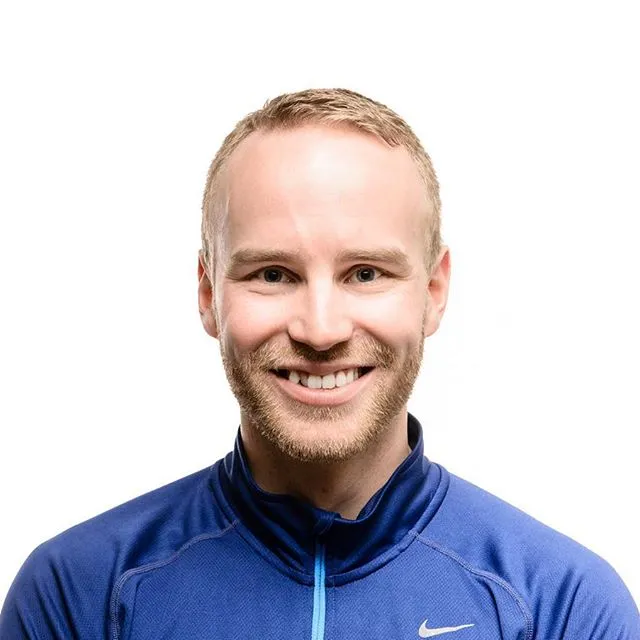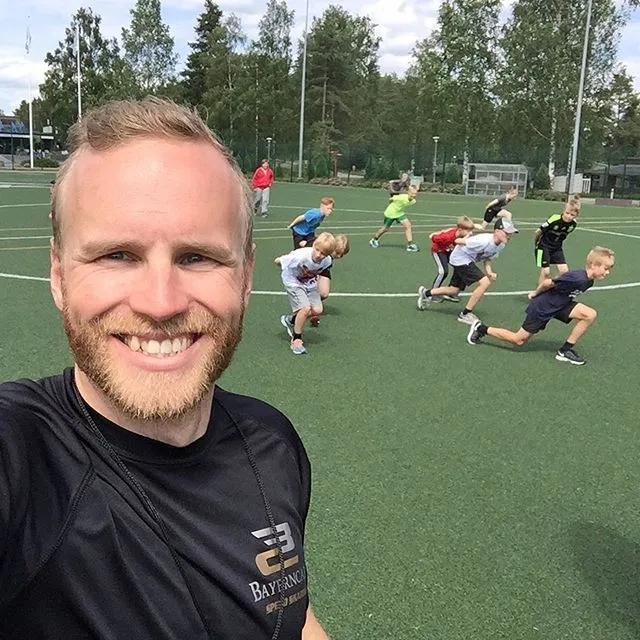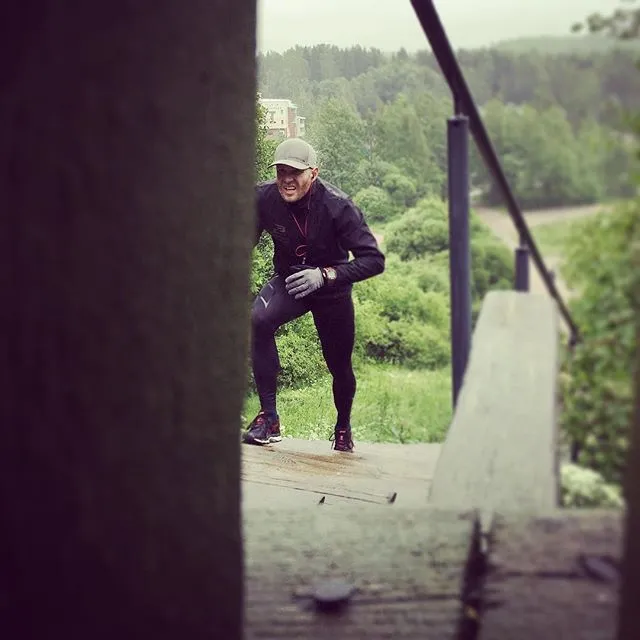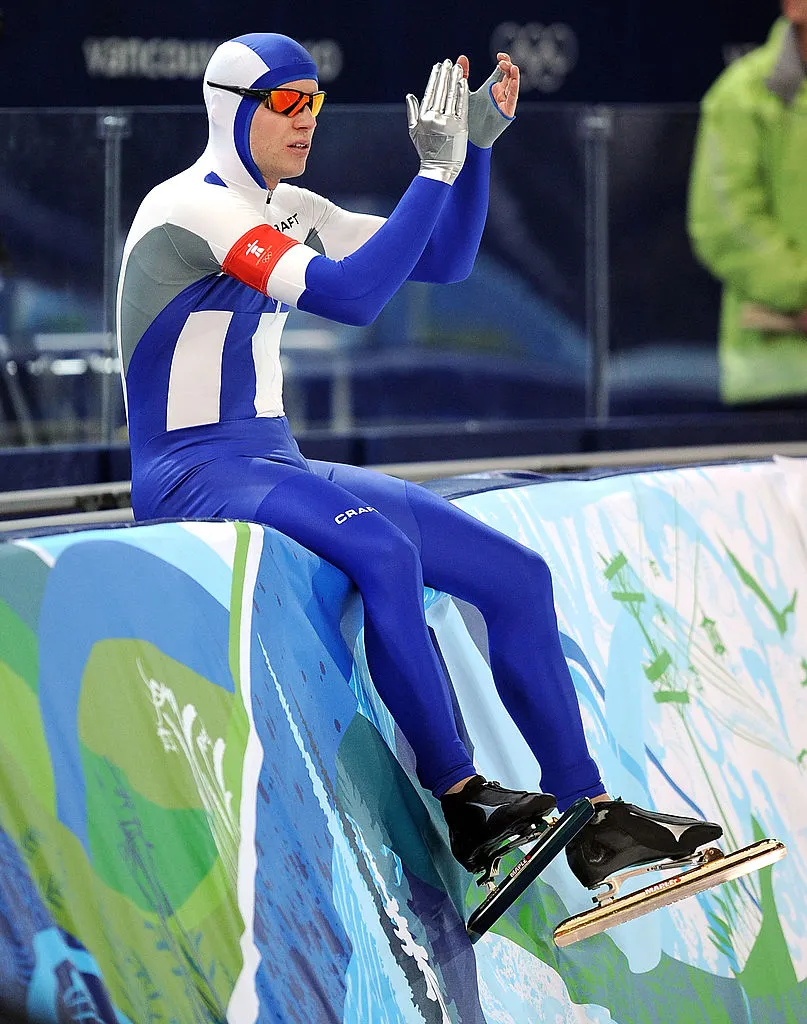Q=interviewer (Irene Postma for ISU), M = Mika Poutala
 Q: How did you prepare for this season and is it different from last season?
Q: How did you prepare for this season and is it different from last season?
M: It is a little bit different, because last season I changed my coach to Kevin Crockett, but I changed it in August so I trained by myself before August and this year is the first year I have trained the whole year with Kevin and his program. And I also skated a month longer before the season, I skated 3 months before the season and last year I skated only two months before the season.
Q: Why did you start skating later last year?
M: It was kind of financial, this season too, and we were speaking during the summer if it was possible to train with the Canadians, and when it happened it was already kind of late in the summer. That was how it went. I didn’t choose to skate so late. Even though I went there later, I still did three times more than I usually do.
Q: Why were you used to even less training?
M: We don’t have an ice rink in Finland and so we can’t skate there. So every time we are skating we have to travel somewhere, and it always cost a lot of money. And the Finnish Federation doesn’t have that much money so we can't travel all the time, and actually most of the Finnish skaters don’t want to travel that much. It is also hard for me because of my family. I don’t think I would want to skate more before the season if I have to go always to training camps because then I am away from my family…
Q. You have a wife and two children, is that correct?
M: Yes. And now it was perfect because I got to skate a lot and my family was with me. That was perfect for me. They travel to Calgary (CAN) with me and now they are back at home in Finland.
 Q: This is the perfect solution for you or is there still something you wish to change?
Q: This is the perfect solution for you or is there still something you wish to change?
M: Well, it is the perfect solution for me before the season. But still, when the season is on, I still don’t have a place where I can skate all the time. Because now I am back home in Finland. I can skate outdoors, but the weather is so different that it is not the same thing. The perfect solution would be for me to live somewhere where there is an indoor oval all the time.
Q: So ideally there should be an indoor oval in Finland?
M: Yes, if there is a good team. Right now it would be to live in Canada for half a year or seven to eight months, but it is not possible for me right now because of the family and finances, too.
Q: Do you get support from the Finnish Federation, or a sponsor?
M: The Finnish Olympic Committee and Finnish Federation pay all my travelling costs. Earning a living -- I still have to work a little bit. I have a few sponsors. And I am trying to sell my book. (‘What it takes to succeed’ has just been translated from Finnish into English).
I do public speaking sometimes, kind of motivational. My main message is how you can be the best “you”, how can you bring up your potential. So it is not mainly about getting people to be positive, but actual tips how you can change your personal thinking or your routines and stuff like that. It is mainly what I wrote in my book.
Q: Did you sell a lot of books in the Netherlands?
M: There were only 10 people at the book signing, and that is the only place I presented it. Now I am only promoting the webpage where people can order www.moooves.com. You can’t buy them anywhere right now, I am still looking for places where I can sell them.
Q: Did the book provide a finance boost for you?
M: I earned something from the Finnish book, I sold something like 2500 Finnish books and I published that myself and then I also donated some of the money to young athletes who don’t have money, I bought some equipment for them.
 Q: Has your approach to training changed over the years?
Q: Has your approach to training changed over the years?
M: Yes, it has a little bit. Especially last year, when I went to Kevin’s group, I have never trained that way. We changed how I used to train a LOT. And I learned that I am actually capable of training a lot more than I thought I was. It was a really eye-opening experience for me. For example, I have never trained like a hard ice session… and then afternoon low walks and weights in the same day. I have always done a really hard ice session and then recovery. But now there were like two or almost three really hard trainings in one day, so that was something really different.
We also have like two recovery days almost every week, so that is also different. I used to have one recovery day every week. That is also nice, then I can plan something with my family. Because I always know that these certain days are recovery so we plan our schedule really well, which is nice.
Q: What have you learned technically?
M: I think I became more consistent. There are some small things that Kevin has taught me technique-wise. I have been skating so long that it is really hard to change my technique. But there are some small things. For example at the start I am twisting my upper body a lot. Kevin doesn’t like that so he wants me to keep my upper body more still. And that is really good when I can do it, it feels really good. And one of the really big things is that I now have an actual mechanic working with my blades. Previously I have only checked my blades once or twice a year with someone and now I have a guy, Alex, who is checking them every week, making sure that they are good, and that is a really big difference.
Q: This season you started really well, even the 1000m wasn’t a problem anymore?
M: Yes, I have been really strong this summer and this fall and I also skated a really big Personal Best on the 1500m before the season. So I knew I was in really good shape, but then I got a little bit sick during the second World Cup, in Japan, and I got a week off training after that, so I have been struggling a little bit the last races. I have not been that far from the podium in the 500m but the 1000m has been suffering from that a lot.
Q: What is your goal now that you are trying to reach this year?
M: In skating? My main goal is winning World Championships, but this year there is a European Championships for sprinters, and that is my second goal. For this year, of course the big goal is to win Olympic Gold, I have that goal for 7 years already.
Q: You told us about your skating goal but there must be another goal on your mind?
M: There are many goals, in my mind. One of the things that I am really excited about after my skating is to be with my family every day. It is really frustrating and really hard to be away from them so much. That is also somehow one of the worst things in Speed Skating now. And I am also interested in entrepreneurship and I would like to do more of the public speaking I’m doing right now, it’s something I really enjoy and want to continue that after my skating career.
 Q: What is the highlight for you, in your career?
Q: What is the highlight for you, in your career?
M: One of the highlights of course is the Vancouver Olympic Winter Games that I won the first 500m. And that was the turning point that I actually started to believe in myself that I can win every race that I am racing. Many times I have been very close to a medal, but I have been five years without medals before last year so my first medal after 5 years was really memorable, That was last year, the first 500m in Calgary when I was second, so that was the highlight of the last six years.
Q: What made you decide to continue after the Sochi Winter Olympic Games? You had said you’d most likely retire?
M: Yes, I was 90-percent sure that I would quit. I took four months that I didn’t train at all. I told myself I was not going to skate if I didn’t fall in love with training again. I just didn’t feel like training, I didn’t want to train, it was not fun anymore. Then I hung out two days with Tuomas Nieminen who is coaching team Finland here, he came with his family to my place, and we just talked about skating, all the memories that we had, and a few days after he left I somehow just felt that I really wanted to go training. So then I decided I was going to continue and it was a surprisingly good season for me after such a long break, for the 500m. Of course the 1000m was not that good, but now I try to build my 1000m back up again.
Q: Do you still rap?
I don’t rap anymore. I was asked recently in an interview to rap. But I haven’t been rapping for five years.
Q: And maybe people would like to know: Why do you always act funny at the start?
M: That is my way of giving thanks back to the spectators. Because: without the spectators we would not have the sport. I just want people to enjoy the competition, and I also want to get people to be happy. I am normally that guy, if someone feels sad and they are kind of alone, I would go there and cheer him or her up. That is kind of who I am. That comes from me naturally. So I don’t really try to act anything. That is just what I am about. I think people don’t understand that is who I am; I’m trying to be who I am.
Q: But is it not taking away from the focus on the race? Are you focused on the moment the gun goes off?
M: For me, I appreciate a lot more feeling really excited and energetic, than being so focused about the race, so I don’t really need that, but when the starter says ‘Go to the start’, I am really sinking into the focus. I really don’t need a lot of time to get to the focus. If I don’t get excited before the race, I don’t think I can be so explosive from the start. When I feel really uplifted and good, I think I can skate fast.
Mika Poutala puhuja esittely from Plastic on Vimeo